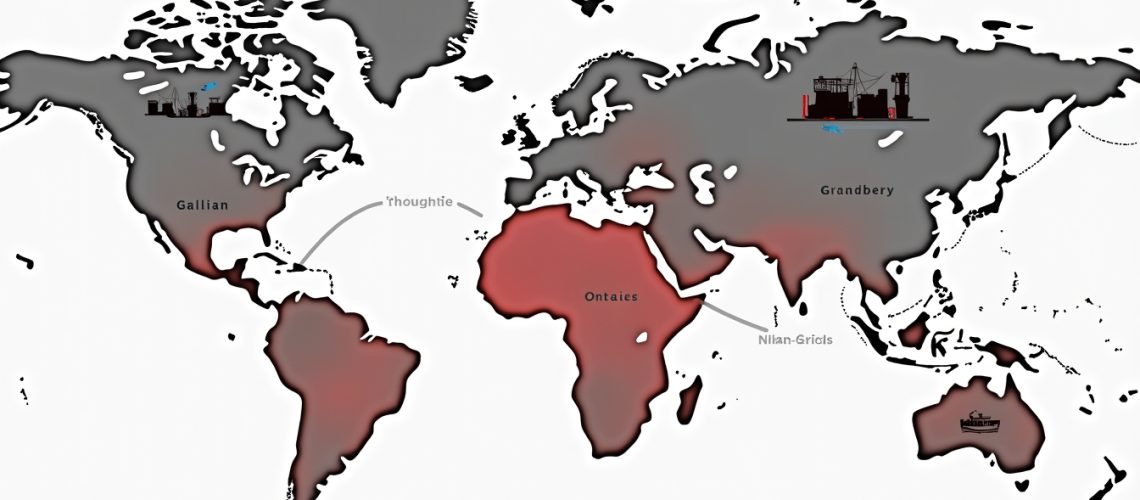China's Niche Metals Export Ban: Strategic Implications for Canadian Firms
The global mineral supply chain has experienced a significant disruption with China's recent export restrictions on critical metals. In 2022, the United States imported $48 million worth of gallium and germanium, with over 50% of these strategic minerals sourced directly from China. These export bans targeting gallium, germanium, antimony, and graphite represent a critical geopolitical shift with profound implications for North American industrial and technological sectors.
Which Niche Metals Are Most Impacted by China's Export Restrictions?
The banned metals play crucial roles across multiple high-technology domains. Gallium serves as a critical semiconductor component, while germanium is essential in fiber optic communication systems and advanced medical technologies like chemotherapy equipment. Antimony contributes to flame retardant manufacturing and battery production, and graphite remains fundamental in lithium-ion battery development for electric vehicles.
The strategic importance of these minerals cannot be overstated. Their applications span semiconductor manufacturing, aerospace technologies, military equipment, and renewable energy infrastructure. According to industry experts, these metals represent more than mere industrial inputs – they are fundamental to national technological capabilities and economic competitiveness.
How Will Canadian Mining Firms Respond to the Supply Chain Disruption?
Canadian companies are strategically positioned to capitalise on this geopolitical shift. Teck Resources produces germanium as a byproduct of zinc processing near the United States border. Neo Performance Materials stands as North America's sole gallium producer through advanced recycling processes, while Northern Graphite Corporation operates the continent's only dedicated graphite mine in Quebec.
The opportunity presents significant potential for Canadian mineral producers. Rahim Suleman, CEO of Neo Performance Materials, noted that "the Chinese export restrictions have created a substantial supply gap which Canadian firms are well-positioned to fill." This sentiment reflects the strategic advantage Canadian firms hold in proximity to the United States market.
What Challenges Confront Canadian Producers?
Despite promising opportunities, Canadian firms face substantial challenges in scaling production. High operational costs and limited pricing power represent significant barriers. Hugues Jacquemin, CEO of Northern Graphite, highlighted that customers remain hesitant to pay premium prices even during critical supply shortages.
The production landscape remains complex. Neo Performance Materials currently operates a modest 35-employee gallium recovery unit, indicating the nascent stage of North American production capabilities. Additionally, potential trade tariffs proposed by incoming political administrations could further complicate market dynamics.
Global Market Evolution and Geopolitical Implications
The export ban signals broader trends in international resource strategies. Digital transformation in mining and technological innovation will play crucial roles in addressing these supply chain challenges. Countries are increasingly focusing on developing domestic mineral production capabilities to reduce dependence on single-source suppliers.
Canada's proximity to the United States offers a strategic advantage in this emerging market landscape. By developing robust mineral production infrastructure, Canadian firms can potentially become critical suppliers for high-technology and defence industries seeking alternative sources to Chinese exports.
Potential Benefits for Canadian Mineral Producers
Increased demand spans multiple sophisticated industrial sectors. Semiconductors, green energy technologies, defence systems, and medical equipment all require these critical minerals. The potential for market expansion appears significant as global industries seek to diversify their mineral supply chains.
The strategic location of Canadian mineral resources provides additional competitive advantages. Reduced import/export costs and shortened supply chains make Canadian producers increasingly attractive to North American industrial consumers seeking reliable, proximate mineral suppliers.
Broader Implications for Global Trade Dynamics
The export restrictions represent more than an isolated economic event. They reflect escalating trade tensions and strategic resource competition between global powers. The geology of ore deposits becomes increasingly relevant as nations reassess their mineral procurement strategies.
Countries are actively developing strategies to enhance mineral supply chain resilience. Government subsidies, strategic investments in domestic production, and diplomatic negotiations will likely characterise the next phase of global critical minerals management.
Market Outlook and Strategic Considerations
Canadian mining firms stand at a critical juncture. By investing in technological innovation, expanding production capacities, and establishing strategic partnerships, they can transform this geopolitical disruption into a significant market opportunity.
The coming years will test the adaptability and strategic vision of North American mineral producers. Those capable of rapidly scaling production, maintaining competitive pricing, and demonstrating technological sophistication will likely emerge as key global suppliers in this evolving market landscape.
Are You Keeping Up with The Latest Mineral Discoveries?
Stay ahead of the game with Discovery Alert’s real-time notifications on significant ASX mineral discoveries. Our AI-powered service simplifies complex drill results, providing you with actionable insights for both short-term trades and long-term investments. Perfect for novice and experienced investors alike, Discovery Alert offers a 30-day free trial to transform your mineral investing strategy. Discover the possibilities now at Discovery Alert.







